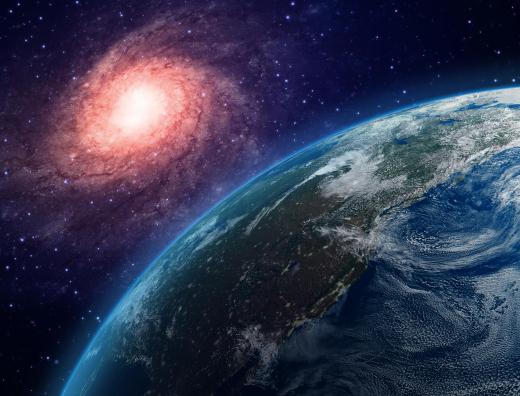What is Cosmology?
 Michael Anissimov
Michael Anissimov
Cosmology is the study of the universe and humanity’s place in it. In the last few hundred years, cosmology has been dominated by physics and astrophysics, primarily being based on religion prior to that. Seeking to give humanity answers to “Big Questions,” religion and mythology have offered various answers to the origin of the universe and its arrangement since prehistory, but these explanations are replaced by contemporary scientific observations and theories.
However, one should not assume that the current scientific conception of cosmology is correct. Although the general picture has remained the same since the 1920s, the specifics are often revised based on new observations and theories. Most notably in the history of cosmology, in 1964 the cosmic microwave background radiation was detected.

Modern cosmology has accumulated massive evidence, such as the cosmic microwave background radiation, that the universe began with a huge explosion known as the Big Bang. This occurred approximately 13.7 billion years ago. Starting from a singularity with zero volume and tremendous mass, the universe was born. Not only was matter ejected into space, but space itself originated with the Big Bang. Asked on a talk show “what came before the Big Bang”, the legendary physicist Stephen Hawking responded, “What lies north of the North Pole?” indicating that the question was meaningless. However, some physicists consider it likely that our universe is a baby universe of an earlier parent universe.

Our current observable universe is estimated to be about 90 billion light-years in diameter. This is only the observable universe, however, and the entirety of the universe may be much larger, or even infinite. Most physicists working in cosmology also argue that the universe is just one among many, embedded in a larger multiverse.
Recently, the idea of anthropics has gained currency within cosmology. Anthropics refers to observer biases. Most obviously, we find ourselves in a universe capable of sustaining life. Physicists have performed thought experiments where the fundamental physical constants have been modified by tiny increments, and they have concluded that many of these possible sets of physical law would preclude the formation of stable planets or other requirements for life. Rather than suggesting that the universe was fine-tuned by a deity, this indicates that our universe is likely one in a huge ensemble of largely lifeless universes.
AS FEATURED ON:
AS FEATURED ON:













Discussion Comments
I watched "how the universe works" on t.v. the other night . The show's experts showed how little they knew on the subject. The show should have been called " how little we know about how the universe works". I think the people 'in the know' watch these shows for entertainment. Happy trails people.
Cosmologists and scientists in general will never put a gut theory together using the "big bang," as its overriding theory. I believe a half-dozen "armchair" physicists at the local bar could come up with better crap than current cosmology.
The true overriding concept is "which came first? the chicken or the egg?". This is because we are only one of many "emerging intelligences" in this galaxy alone. Life is prevalent throughout the universe; always has been; always will be. What we become is largely up to us. We are akin to plant seeds. Not all will find a suitable place to grow. Supernovas take life and spread life at the same time. It is no mystery. In the next decade, we should have the technology to see beyond the cosmic microwave background limit. It will require much larger and techno-savvy detector-telescopes.
The microwave and on down to radio-wave background will be resolved to produce images of more and more galaxies. I like the term "tired light". It hints at a complication that astronomers and astrophysicists have overlooked. Happy trails.
@Armas1313
I would disagree with what you seem to be implying about a fine line between intuitive and empirical reasoning. I think that philosophy and science are shown to complement each other quite well in the field of cosmology and that math can be used to support certain intuitive theories about the fate of the universe. I am especially interested in the theories of Frank Tipler and his theory concerning the Omega Point. He combines a solid mathematical background with intuitive hypotheses to support his data.
Cosmology is largely based on intuitive reasoning and is beyond the capacity of empirical logic. Trying to apply standard mathematics to infinity is insanity, as witnessed by great mathematicians such as Cantor, Godel, and Turing. Understanding what lies beyond, before, and ahead, of the limitations of our human reasoning is largely a matter of philosophy.
Can a singularity actually explode? Wouldn't the expansion of matter define the 'infinite' gravitational forces that exist within a singularity?
Post your comments